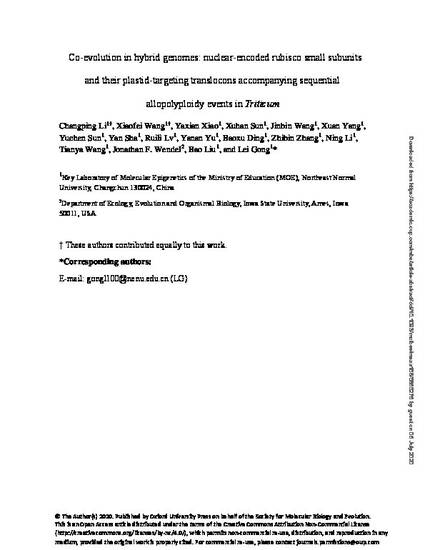
The Triticum/Aegilops complex includes hybrid species resulting from homoploid hybrid speciation and allopolyploid speciation. Sequential allotetra- and allohexaploidy events presumably result in two challenges for the hybrids, which involve 1) cytonuclear stoichiometric disruptions caused by combining two diverged nuclear genomes with the maternal inheritance of the cytoplasmic organellar donor; and 2) incompatibility of chimeric protein complexes with diverged subunits from nuclear and cytoplasmic genomes. Here, we describe coevolution of nuclear rbcS genes encoding the small subunits of Rubisco (ribulose 1,5-bisphosphate carboxylase/oxygenase) and nuclear genes encoding plastid translocons, which mediate recognition and translocation of nuclear-encoded proteins into plastids, in allopolyploid wheat species. We demonstrate that intergenomic paternal-to-maternal gene conversion specifically occurred in the genic region of the homoeologous rbcS3 gene from the D-genome progenitor of wheat (abbreviated as rbcS3D) such that it encodes a maternal-like or B-subgenome-like SSU3D transit peptide in allohexaploid wheat but not in allotetraploid wheat. Divergent and limited interaction between SSU3D and the D-subgenomic TOC90D translocon subunit is implicated to underpin SSU3D targeting into the chloroplast of hexaploid wheat. This implicates early selection favoring individuals harboring optimal maternal-like organellar SSU3D targeting in hexaploid wheat. These data represent a novel dimension of cytonuclear evolution mediated by organellar targeting and transportation of nuclear proteins.
Available at: http://works.bepress.com/jonathan_wendel/98/

This article is published as Li, Changping, Xiaofei Wang, Yaxian Xiao, Xuhan Sun, Jinbin Wang, Xuan Yang, Yuchen Sun et al. "Co-evolution in hybrid genomes: nuclear-encoded rubisco small subunits and their plastid-targeting translocons accompanying sequential allopolyploidy events in Triticum." Molecular Biology and Evolution 37 (2020): 3409-3422. doi: 10.1093/molbev/msaa158.